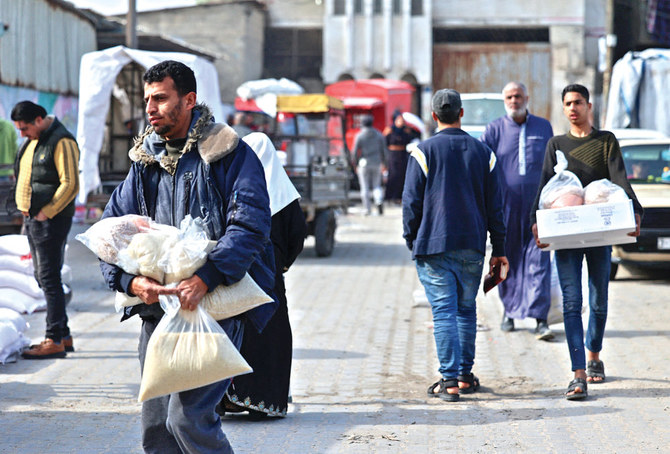RAMALLAH: The Palestinian Authority has reiterated its appeal to the EU to provide its pledged aid without conditions.
The authority is concerned about the continuing uncertainty over the EU’s annual financial support for its budget despite holding several meetings with senior EU officials in recent months.
Palestinian Prime Minister Mohammed Shtayyieh, who met EU High Representative for Foreign Affairs and Security Policy Josep Borrell Fontelles in Brussels last week, urged the bloc to expedite the transfer of its financial support, which has been suspended for two years.
Shtayyieh pointed to a growing financial crisis caused by the drop in external support and the continuation of Israel’s deductions from the tax it collects on behalf of the PA.
“We have called on the European Union to provide its pledged aid without conditions. We hope to accomplish this very soon,” Shtayyieh said at the start of the Palestinian Authority’s weekly Cabinet session on Monday in Ramallah.
The EU postponed the transfer of $223 million in annual aid to the PA after EU members supported Hungary’s condition to change the curriculum in West Bank schools because it “contains incitement against Israel and anti-Semitic content.”
The EU contributed about $156 million annually to the PA budget of which $93 million went to pay the salaries of its civilian employees. Those workers have received between 70 and 80 percent of their salaries for five consecutive months.
The PA suffered a sharp decline in international aid to its budget from $1.3 billion in 2013 to $129 million in 2021.
Samir Hulileh, a Palestinian economist, told Arab News that the policy of European countries has recently been to provide direct support to the Palestinian private sector, marginalizing the PA.
“European countries continue to expand their support for the Palestinian private sector economy, but the official support provided to the Palestinian government is completely halted,” he said.
“This leads to the weak performance of the Palestinian Authority in its functional role and tasks — especially with the halt to US and Arab support for it.”
The value of the budget deficit had reached $1.3 billion, Hulileh said.
At the beginning of this month, the Palestinian Authority presented a broad reform program to the Ad Hoc Liaison Committee to encourage donor countries — especially EU states — to resume their financial support for the PA, a Palestinian source told Arab News.
A senior European source told Arab News: “The EU continued to support UNRWA. What remains pending is the funding to the PA, which is still stuck in Brussels.”
Nevertheless, news reports said that the EU reduced its aid to the UNRWA by 40 percent for the 2022-24 period, from $135 million to $82 million.
The EU said that aid could return to normal levels by changing school curricula and removing what it termed incitement materials against Israel while it continues to delay the $156 million annual financial support to the PA.
The reduction in the EU budget comes amid intense pressure and incitement campaigns against UNRWA last year by Israeli institutions. That led the EU to condemn UNRWA’s use of educational materials, which it claimed incited hatred and violence against Israel and Jews in schools in the West Bank and Gaza Strip. This was the first time the EU had condemned the UN relief agency for its curricula.
The EU demanded the UNRWA “immediately” remove the so-called inflammatory material, stating that its funding “should be conditioned” on the adaptation of educational materials to match the values of the UN that promote peace and tolerance.

